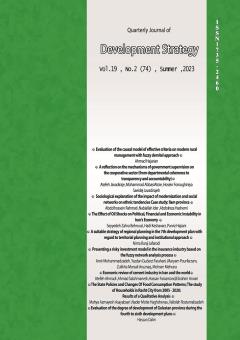A reflection on the mechanisms of government supervision on the cooperative sector (from departmental coherence to transparency and accountability)
Subject Areas :atefeh javadi raje 1 , Abbasi atoie Mohammad 2 , Hossein Foroughiniya 3 , saeedeh javadi raje 4
1 - Student of Ph.D. in Educational Management, Sari Branch, Islamic Azad University, Sari, Iran.
2 - Student of Ph.D. in Public Law, Sari Branch, Islamic Azad University, Sari, Iran
3 - University of farvardin Qaemshar
4 - Master's student in criminal law
Keywords: Keywords: Economy, cooperative sector, supervision mechanism, government. ,
Abstract :
the islamic republic of iran 's economic system according to the constitution and the policies of the implementation of the article 44 , the development of cooperatives is considered as one of the most important tools for realization of public economy . despite the recognition of the cooperative sector as an independent part as the third side of the triangle of iran 's economy , the possibility of the extent and quality of supervision has always been ambiguous . this research , using descriptive - analytical method , seeks to answer these questions : what are the mechanisms and mechanisms of government supervision on cooperative sector ? and does the actions of government governance in the sector of cooperation affect the independence of this sector of the country 's economy ? according to the findings of the present study , " " the mechanisms of government supervision , sectoral cohesion and regulation of laws and regulations , transparent policies and institutional governance as well as monitoring the process of establishment , purification , dissolution and … about these companies . also due to the specific nature of the cooperation sector , its full compliance with the supervision of the government is complex . therefore , the government should merely use governance tools , such as compliance and non - cooperative sector deviation from the rules , play its supervisory duties against the cooperative sector and avoid direct entry into the executive affairs of the cooperative sector .
